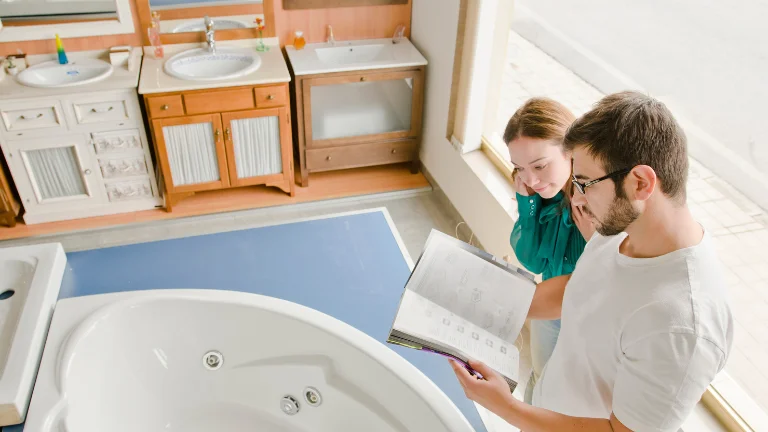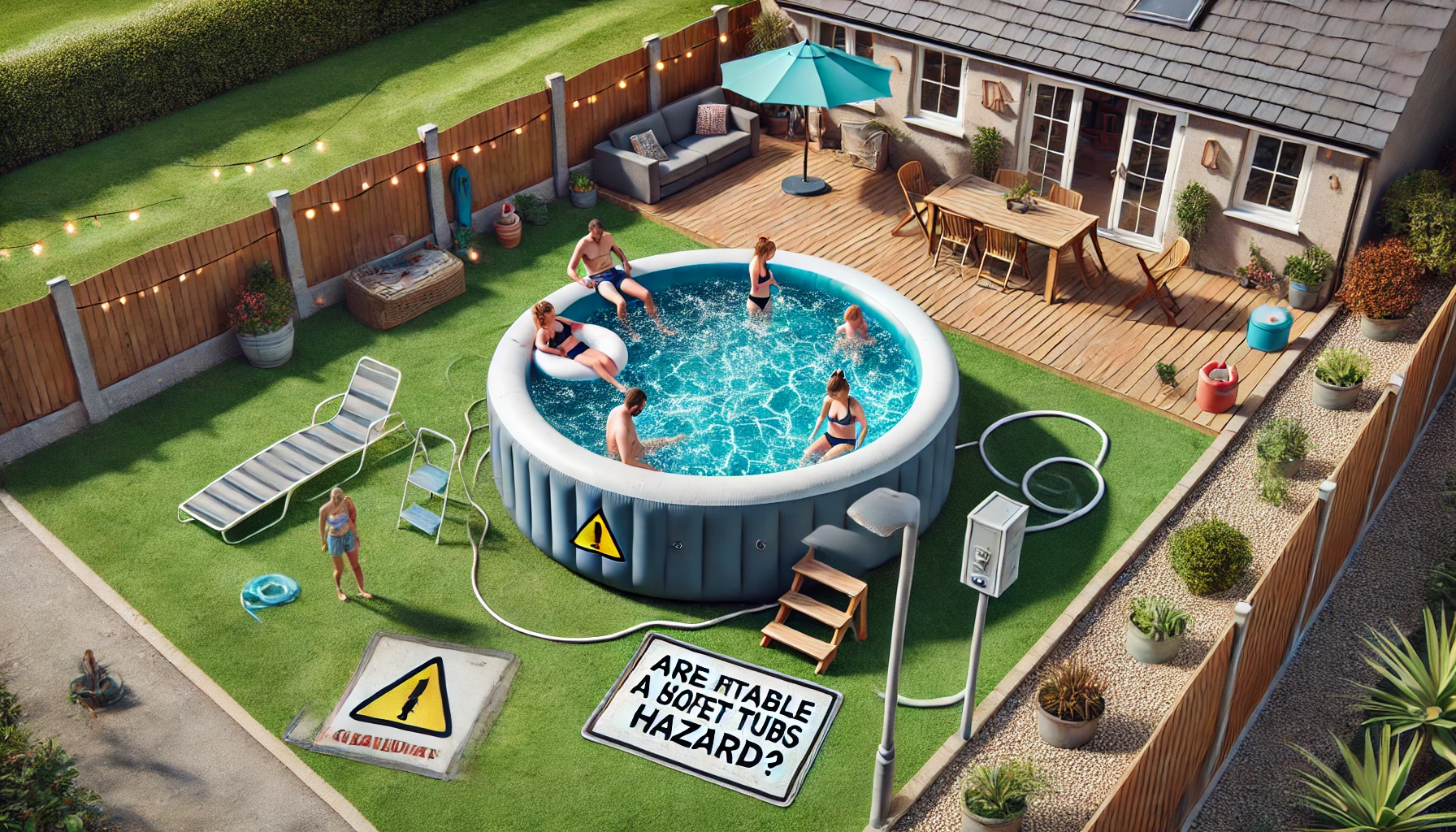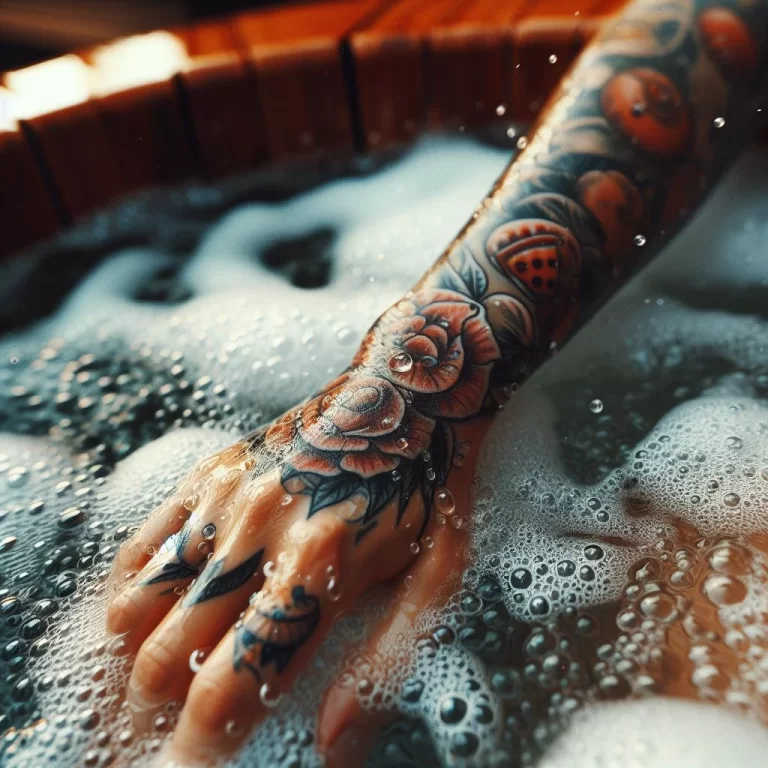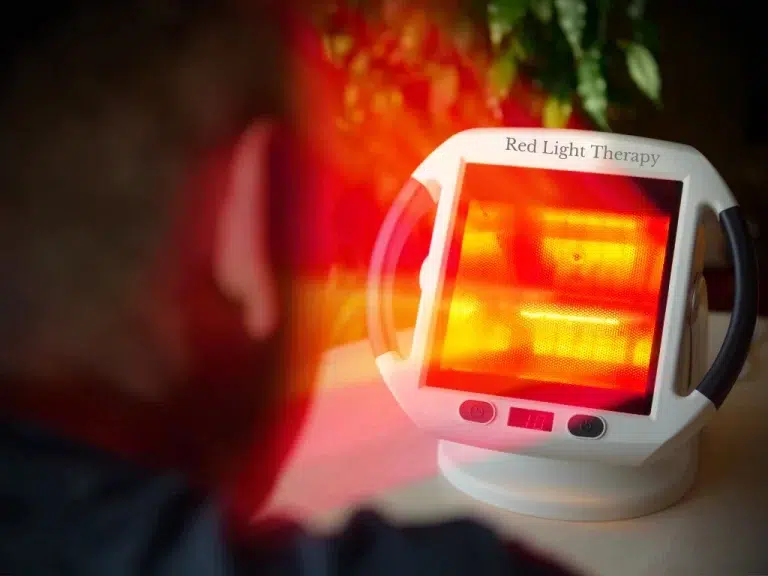Are Inflatable Hot Tubs a Safety Hazard
Are Inflatable Hot Tubs Dangerous? Learn more about the risks and safety tips to get the most out of your hot tub experience.
As hot tub owners, we know that safety is of paramount importance when it comes to enjoying our relaxing soak. With the rising popularity of inflatable hot tubs, many people have questions about their security.
In this comprehensive guide, I will share information to help you understand the safety aspects of inflatable hot tubs and debunk any misconceptions or concerns that may be circulating.
Are Inflatable Hot Tubs Dangerous? Debunking the Myths
Some misconceptions about the safety of inflatable hot tubs need to be addressed. Let’s see some of the common myths and provide accurate information.
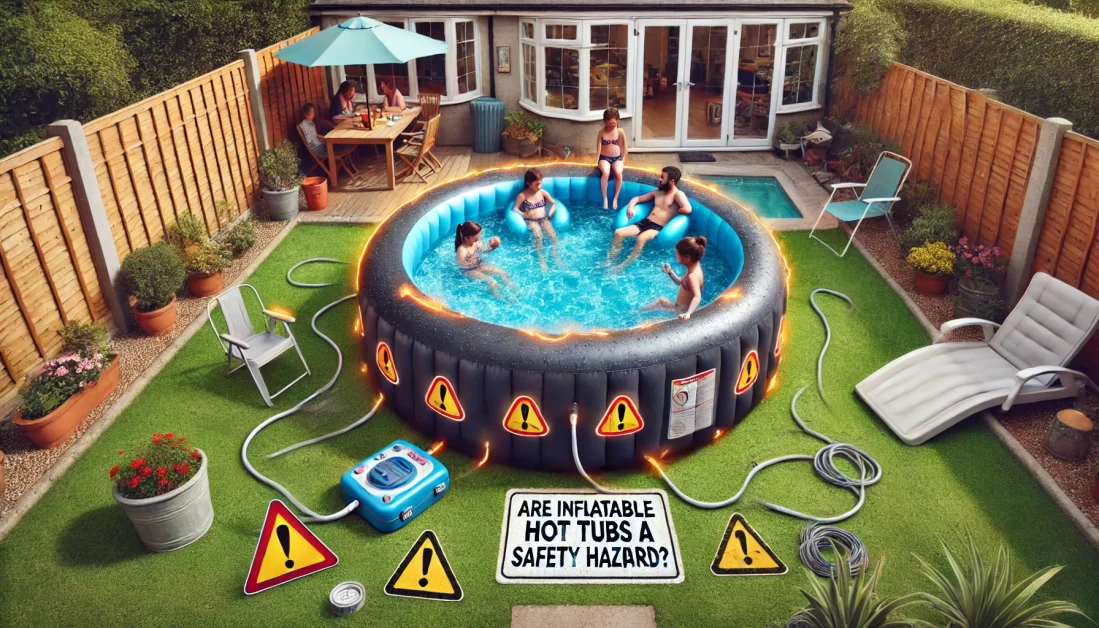
Myth 1: Inflatable hot tubs are not as safe as traditional hot tubs
This is a common misconception. They are designed with safety in mind and undergo rigorous testing and certification processes to ensure they meet strict safety standards. Like traditional hot tubs, inflatable hot tubs have safety features such as locking covers, temperature controls, and timers to prevent overheating.
Myth 2: Inflatable hot tubs are prone to leaks and bursts
While it’s true that inflatable hot tubs are not as sturdy as traditional hot tubs made of hard materials, they are designed to be durable and reliable. Most inflatable hot tubs are constructed with multiple layers of puncture-resistant materials, such as reinforced PVC, to prevent leaks and bursts.
Myth 3: Inflatable hot tubs are not suitable for children
This is a misconception that needs to be clarified. Children can use inflatable hot tubs safely, but proper supervision and caution are necessary. Children should always be supervised by an adult when using a hot tub and should not be left unattended at any time.
It’s also essential to follow the manufacturer’s age and weight restrictions recommendations and ensure children know the safety rules, such as not standing or jumping in the hot tub.
Myth 4: Inflatable hot tubs are not safe for pregnant women
Pregnant women should always consult their healthcare provider before using a hot tub, whether it’s inflatable or traditional. Hot tubs can raise the body temperature, harming the developing fetus.
However, many inflatable hot tubs come with adjustable temperature controls, allowing pregnant women to use them safely by keeping the water temperature within the recommended range of 100-102°F (37-39°C).
Myth 5: Inflatable hot tubs are a fire hazard
Inflatable hot tubs are designed for standard electrical outlets and are equipped with safety features such as Ground Fault Circuit Interrupter (GFCI) protection to prevent electrical accidents. However, following the manufacturer’s instructions for setup and usage is essential to ensure the electrical components are installed and used correctly.
Avoid using extension cords or plugging the hot tub into a circuit overloaded with other electrical devices.
Tips for Are Inflatable Hot Tubs a Safety Hazard
Now that we’ve debunked the myths let’s explore some practical tips for safely using inflatable hot tubs.
Tip 1: Follow the manufacturer’s instructions for setup and usage
It’s crucial to carefully read and follow the manufacturer’s instructions for setting up and using your inflatable hot tub. It includes proper placement, inflation, and filling of the hot tub, as well as using the recommended chemicals and cleaning procedures. Following the instructions will ensure that your hot tub functions optimally and safely.
Tip 2: Regularly inspect and maintain your hot tub
Regularly review your inflatable hot tub to check for any signs of wear and tear, such as leaks, punctures, or cracks. If any issues are detected, address them promptly according to the manufacturer’s recommendations. It’s also essential to regularly clean and sanitize your hot tub to maintain water quality and prevent the growth of bacteria or algae.
Tip 3: Use the hot tub safely and responsibly
Always exercise caution when using your inflatable hot tub and follow basic safety guidelines. Avoid sitting, standing, or jumping on the cover, as it may not support the weight and cause accidents. Never leave children or pets unattended in the hot tub; always supervise them closely.
Limit your hot tub usage to the recommended time frame to prevent overheating, and avoid using it while under the influence of alcohol or drugs.
Tip 4: Be mindful of the water temperature
Hot tubs are meant to relax, but excessively high water temperatures can pose risks. To prevent overheating, it’s essential to keep the water temperature within the recommended range of 100-102°F (37-39°C), especially for pregnant women, elderly individuals, or individuals with medical conditions.
[wps_alert type=”note”]If you experience dizziness, nausea, or discomfort, exit the hot tub immediately and seek medical attention if necessary.[/wps_alert]
Tip 5: Secure your hot tub when not in use
To prevent unauthorized access and ensure the safety of children or pets, always secure your inflatable hot tub with a locking cover or other safety measures when it’s not in use. This will prevent accidental falls, drowning, or other accidents.
I’m considering getting an inflatable hot tub, but I live in California. Is that even possible?
It can be tricky in California. The state has strict energy efficiency regulations for appliances, including hot tubs. These regulations are called “APSP-14” standards. They focus on how well a hot tub retains heat, which translates to lower energy use.
Unfortunately, inflatable hot tubs typically have a more challenging time meeting these standards because their inflatable construction makes them less efficient at keeping heat in. This means manufacturers can’t sell new inflatable hot tubs in California that don’t meet APSP-14.
Things to consider:
- Used Market: You might find a used inflatable hot tub for sale in California. Just be sure to check with the seller to ensure it’s functioning correctly and meets safety standards.
- Out-of-State Purchase: If you’re willing to travel or have one delivered from outside California, you might find new inflatable hot tub options. However, double-check any warranty information, as some manufacturers might only honor warranties for products used within the state of purchase.
If I manage to get an inflatable hot tub, should I leave it on all the time to keep it ready to use?
It’s actually more energy-efficient to heat your inflatable hot tub only when you plan to use it. Here’s why:
- Constant Heating: Keeping the water hot constantly uses more energy, even with the insulation inflatable hot tubs have. It’s like leaving a light on all day – unnecessary energy use!
- Wear and Tear: Constantly running the heating elements can put extra stress on them, potentially reducing the lifespan of your inflatable hot tub.
Instead, plan ahead and turn on the hot tub a few hours before you want to use it. Most models heat up relatively quickly.
Inflatable hot tubs sound a little delicate. Are they prone to punctures?
They can puncture, but they’re not necessarily fragile. Here are some things to keep in mind:
- Sharp Objects: The most significant risk comes from sharp objects like rocks, jewelry, or even pet claws. Be mindful of what’s around the hot tub when it’s inflated.
- Rough Surfaces: Setting up your inflatable hot tub on a rough or uneven surface can increase the chance of punctures. Use a smooth, flat surface like a tarp or specialized hot tub mat.
The good news is that most inflatable hot tubs come with repair kits for small punctures. So, if an accident happens, you can patch it up yourself.
Even though it’s inflatable, do I still need chemicals for the water?
Absolutely! Like a traditional hot tub, an inflatable one requires chemicals to keep the water clean and sanitized. The good news is the process is similar; you’ll just be dealing with a slightly smaller volume of water. You’ll still need things like chlorine or bromine tablets, a sanitizer floater, and shock treatment to maintain proper water chemistry.
Final Arguments:
Hot tubs are a popular and convenient option for relaxation and enjoyment, and with proper use and maintenance, they can be safe and reliable. By following the manufacturer’s instructions, practicing responsible usage, and being mindful of water temperature, you can enjoy your hot tub without compromising safety.
[wps_note size=”17″ background=”#fae588″ color=”#333333″ radius=”3″]Remember to inspect and maintain your hot tub regularly, and always prioritize the safety of yourself and others. So indulge in a soothing soak in your inflatable hot tub, knowing you are well-informed about its safety.[/wps_note]
For additional information, visit Hot Tub Patio, or if you’re reading more guides for hot tubs, visit Hot Tub Safety.
Common Queries:
[wps_faq style=”classic” question=”Are inflatable hot tubs safe to use?”]Inflatable hot tubs can be safe to use according to the manufacturer’s instructions and guidelines. Proper installation, inflation, filling, and maintenance, as well as following basic safety precautions, can ensure safe usage.[/wps_faq]
[wps_faq style=”classic” question=”Can inflatable hot tubs burst or leak?”]While rare, inflatable hot tubs can burst or leak if improperly maintained or subjected to excessive pressure or damage. Following the manufacturer’s instructions for inflation, placement, and usage, as well as regular inspections and maintenance, can minimize the risk of leaks or bursts.[/wps_faq]
[wps_faq style=”classic” question=” Are inflatable hot tubs suitable for children?”]Inflatable hot tubs are generally not recommended for unsupervised use by children, as they can pose risks of drowning or accidents. Always supervise children closely and follow the manufacturer’s age and usage restrictions guidelines to ensure their safety.[/wps_faq]
[wps_faq style=”classic” question=”Are inflatable hot tubs suitable for pregnant women?”]Pregnant women should consult their healthcare provider before using an inflatable hot tub. High water temperatures can potentially harm the fetus, and it’s essential to follow the recommended water temperature guidelines and seek medical advice if pregnant or with any health concerns.[/wps_faq]
[wps_faq style=”classic” question=”Do inflatable hot tubs pose a fire hazard?”]Inflatable hot tubs are typically powered by electricity and require proper electrical connections and usage. Following the manufacturer’s instructions for electrical setup, usage, and maintenance can minimize the risk of fire hazards. It’s important to avoid using extension cords or overloading electrical outlets and always prioritize electrical safety.[/wps_faq]

